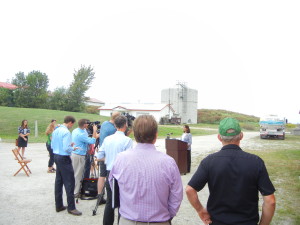Algae for Biofuel Cultivating at Charlotte’s Nordic Dairy Farm
 Algae for biofuel has been a long time component of the local biofuel production for local use model pioneered by the Vermont Bioenergy Initiative. At the forefront of these efforts has been Anju Dahyia, a VBI grantee, lead biofuels instructor at the University of Vermont, and president of General Systems Research (GSR) Solutions. When the Vermont Fuel Dealers Association received a USDA Rural Business Enterprise Grant to utilize waste materials from Vermont farms to produce sustainable distillate fuel, Anju and GRS Solutions were already in a prime positon to conduct the necessary research.
Algae for biofuel has been a long time component of the local biofuel production for local use model pioneered by the Vermont Bioenergy Initiative. At the forefront of these efforts has been Anju Dahyia, a VBI grantee, lead biofuels instructor at the University of Vermont, and president of General Systems Research (GSR) Solutions. When the Vermont Fuel Dealers Association received a USDA Rural Business Enterprise Grant to utilize waste materials from Vermont farms to produce sustainable distillate fuel, Anju and GRS Solutions were already in a prime positon to conduct the necessary research.
GSR is developing a method of producing algae biofuel to replace traditional fossil fuels in motor vehicles, heavy farm equipment, and even airplanes at Charlotte’s Nordic Dairy Farm as a second tier to the already operational anaerobic digesters contributing to Vermont’s distributed energy generation grid. The process to produce algal biofuel has the potential to prevent nutrients such as phosphorus and nitrogen from making their way into local lakes and waterways. Nordic Dairy Farm’s owner, Clark Hinsdale, explained at a recent press event on his farm: “the best way to capture excess nutrients on farms is to never let them get beyond the boundaries of the farmstead.”
The current anaerobic digestion system “Cow Power,” utilized by Green Mountain Power, functions by using the methane byproduct harvested from constantly produced cow manure to make electricity that then is sold to Green Mountain Power customers. The research done by GSR focuses on another byproduct of digestion – the nutrient dense liquid waste, previously left unused for power purposes.
The oleaginous algae strains that Anju Dahyia has been working with since 2008 thrive on this dense waste and after the algae has consumed the available nutrients, the creation of the distillate fuel can begin. The result makes the process a closed loop system, and means that dairy farmers like Nordic Dairy (whose cows produce up to a ton of manure a day) would be able to sell algae derived biofuel to local fuel dealers and create granular organic fertilizer. According to Dahyia, Hinsdale’s 300 cows alone have the potential to produce anywhere between 20,000 to 30,000 gallons of biofuel each year.
The cost of production is estimated at $20 dollars per gallon, but Dahyia thinks that with increased scale will come a decreased price. At the recent press conference at the Nordic Dairy Farm site early in September, Mary Powell of Green Mountain Power outlined how the company is working with GSR Solutions to help increase scale and add more small refineries that mimic this operation. She went on to note the resiliency a community-sized digester refinery can add to a microgrid.
Speaking to ABC local 22 News, Matt Cota, Director of the Vermont Fuel Dealers Association added, “We know that bio-heat, renewable blended fuel, combined with heating oil works in customers tanks and burners, so if we can source that locally, it would be a great thing for Vermont’s economy, for Vermont famers, Vermont fuel dealers and consumers all across Vermont.”
Richard Altman of the non-profit Commercial Aviation Fuels Initiative was also in attendance and trumpeted that “community-scale digester-refineries in the region might be feasible by 2020,” noting that this project is just a start.
Also on the horizon, GRS Solutions is already working to go further with this technology by incorporating food waste into this digester system. While this system may be in its early stages, one thing is for sure, Vermont energy stakeholders are lining up to show their support and contribute to this more than viable option for local energy production.
For more watch the local WCAX coverage of the September 3rd press conference and to learn more about Algae Bioenergy in Vermont see our other post Algae Biofuel – Vermont’s Search for Viable and Cost-Effective Methods





